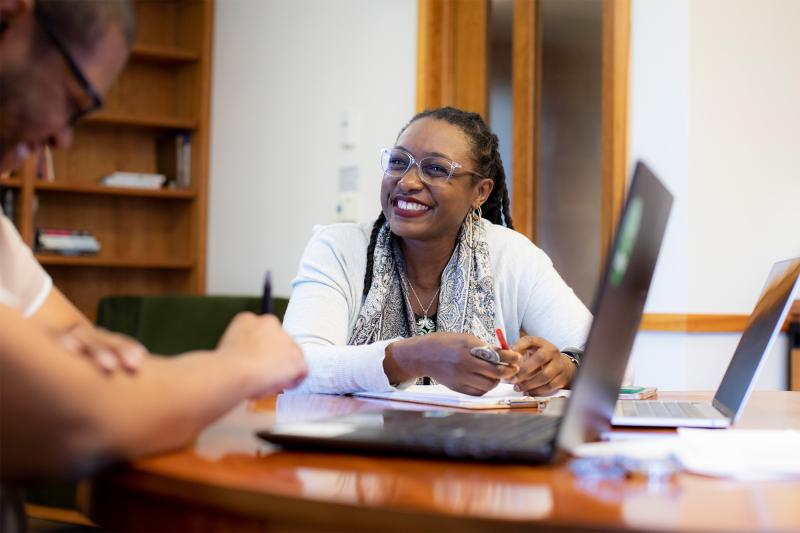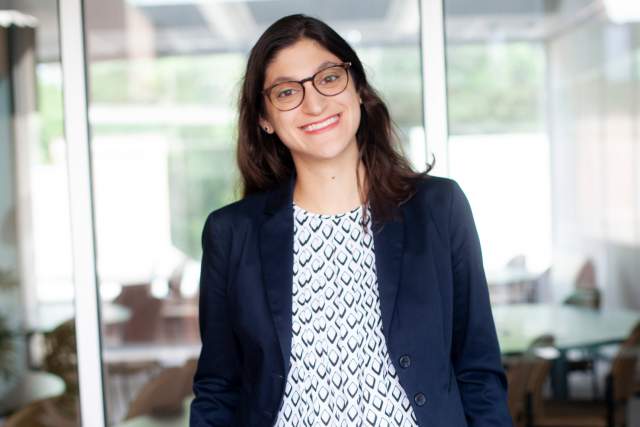One of the things Michelle Kinch loves about teaching operations to MBA students is the chance to dispel some of the myths around it. Many students begin with the belief that operations management is about mathematical models, data analytics and spreadsheets—and dominated by manufacturing contexts. To Kinch, an assistant professor of business administration at Tuck, the name “operations” obscures its true nature: a value creation system with humans at its core. That system strives to make a business effective and efficient, minimizing waste and optimizing performance to meet customer requirements—whether the firm is building planes or flying passengers in them.
“People have to oversee plans and execute plans,” Kinch says, “and people are operating equipment, making decisions, and intervening all the time. It’s difficult to achieve optimal performance of an operational system without understanding how humans enact it, interact with it, or evaluate it.”
Kinch came to this conclusion through a unique path that includes a Bachelor of Science in Management Science from MIT, and an MBA and DBA from Harvard Business School, plus 15 years as a professional in the financial services industry with firms such as State Street Global Advisors, Fidelity Investments, and LPL Financial.
It’s difficult to achieve optimal performance of an operational system without understanding how humans enact it, interact with it, or evaluate it.
— Michelle Kinch
Finance runs in Kinch’s family. Her father was an executive on Wall Street and her mother was an internal auditor at a regional bank in New York, where she grew up. The Monday after graduating from high school, she started a summer internship at Bear Stearns and she went on to other summer stints at Oppenheimer & Co. and Citi-bank during college. At MIT, she planned to major in physics, but changed her mind after an internship at AT&T Bell Labs, working on their hybrid fiber coaxial cable platform—the precursor to broadband. Her job was to test the platform and reduce its signal-to-noise ratio. Later that summer, Southern New England Telephone was coming to the lab to decide whether to fund additional R&D, and Kinch’s boss asked if she wanted to help pull together material for the presentation and sit in on it. When she started working on that assignment, she learned she liked it a lot more than doing the solitary scientific work in the lab. “I felt comfortable with the technical aspects of the work,” she recalls, “but I really enjoyed working across the team to explain how we take this wonderful science and strategically apply it to business opportunity. Being at the intersection of state-of-the-art and state-of-the-market was invigorating. It felt like solving a puzzle.”
Kinch returned to MIT and changed her major to Management Science, which put her at the Sloan School of Management. After graduation, she went to work at State Street, which gave her another occasion to match research with market opportunity. It was the dawn of the 529 college savings system, which allows people to invest money tax free to spend on higher education, and State Street was poised to enter the market. Kinch helped the firm develop a pre-paid tuition program that was contracted with the state of New Mexico and spun off into a wholly owned subsidiary called Schoolhouse Capital. With that experience, she applied and was accepted to Harvard Business School’s MBA program the following year.
I really enjoyed working across the team to explain how we take this wonderful science and strategically apply it to business opportunity.
At Harvard, one of Kinch’s first courses was with Frances Frei, the UPS Professor of Service Management. Kinch confided in Frei that she wanted to pursue a doctorate. Frei gave her some good advice: immerse yourself deeply in practice, find the research question that doesn’t leave you, and bring that to academia.
Kinch followed that advice and started at Fidelity once she completed her MBA. There, Kinch worked on the platform that would empower retail investors to manage their own investment portfolio through web-based tools and mobile apps. From an operations perspective, one presumed benefit of the self-service tools is that they would reduce the firm’s labor costs, since customers wouldn’t need person-to-person assistance as much. But the reality was more complicated. Customers would start using the online tools, and then pick up the phone and call a customer service representative who would stay on the phone while the customer completed the web-based interaction. In addition, during periods of market volatility, the company’s phone lines would be congested with customers asking for information they could easily retrieve for themselves online. These observations made Kinch curious about what drives customers’ need for human contact in certain business situations.
In 2013, Kinch finally began to pursue her dream of getting a doctorate from Harvard. She studied under Frei and Ryan Buell, and wrote a dissertation titled “Emotion-sourced Variation in Service Operations,” graduating in 2020. In essence, the topic flowed directly from her experience at Fidelity. She wanted to understand whether human emotion influenced service costs in predictable ways such that companies might productively factor the emotions into their service designs. Kinch, and coauthor Buell, study that question in “Mitigating the Negative Effects of Customer Anxiety by Facilitating Access to Human Contact,” which is under review at Management Science. In it, the researchers begin from the premise, established in social psychology research, that when people feel anxious, they seek advice. Kinch and Buell wanted to disentangle whether it was advice or simply human contact that anxious people sought. They also wanted to understand how anxiety impacts trust formation between customers and firms in the absence of human contact, such as when completing a self-service interaction. Through field studies and laboratory experiments they find, among other things, that when customers are feeling anxious, simply having access to either expert or non-expert human contact can offset the ways that anxiety hinders trust formation—and customers don’t have to use the contact channels for firms to benefit. In other words, firms might experience a win-win by inviting anxious customers to reach out to a customer service representative: improving service relationships without increasing service cost.

An assistant professor of business administration, Michelle Kinch teaches the MBA elective Management of Service Operations and recently, the Research-to-Practice seminar Human Behavior in Operations Management. | Photo by Laura DeCapua
Recently, Kinch, who teaches Management of Service Operations and the Research-to-Practice Seminar: Human Behavior in Operations Management, received a proactive notice from Fidelity when the markets were very volatile, reminding customers that they could call anytime and inviting them to schedule an appointment with an advisor. She felt that her work had come full circle.
“It’s rewarding to think about these problems, investigate them rigorously, and see changes in business practice that bring the research to life,” Kinch says. “I hope that this work will ultimately make a difference.”
This story originally appeared in print in the summer 2024 issue of Tuck Today magazine.

